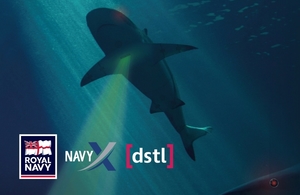Inspired by nature: chance to collaborate on underwater technology
Funding from NavyX and Dstl will back PhD programmes researching new methods of underwater propulsion and design, taking cues from the natural world.

Outline of shark shape in the water
NavyX, the Royal Navy’s accelerator, and the Defence Science and Technology Laboratory (Dstl) are seeking to collaborate with UK academic institutions on the advance of bio-inspired underwater technology and are offering generous PhD packages to back research in this field.
Over millennia, natural selection has honed characteristics such as agility, speed, endurance and stealth that through robotic mimicry may lead to improved range and endurance.
The bio-inspired uncrewed underwater vehicle (UUV) and propulsion PhD cohort programme aims to develop a greater understanding of novel modes of underwater propulsion and platform design. It aims to unlock unrealised competitive advantage through seeking a greater understanding of nature.
The importance of understanding, researching and experimenting with novel propulsion and UUVs of the future remains a priority if we wish to maintain equity with our allies and advantage over our adversaries in this most challenging of environments; it is also anticipated that the advantages of bio-inspired underwater technology may have benefits far beyond the sphere of defence.
Through leveraging the collective might of UK academic institutions, NavyX in collaboration with Dstl seek to seed a burgeoning sovereign market.
Details about the PhD programme will be announced via R-Cloud, the Dstl marketplace for science and technology research, which provides access to security and defence contracting opportunities across all the MOD’s science and technology research areas.
To get involved, register as an R-Cloud provider.
We welcome applications from all types of supplier: non-traditional defence supplier, micro business, small to medium-sized enterprise (SME), academic institution or large organisation, UK and international research suppliers.
Find out more about Dstl’s work on autonomy and robotics.